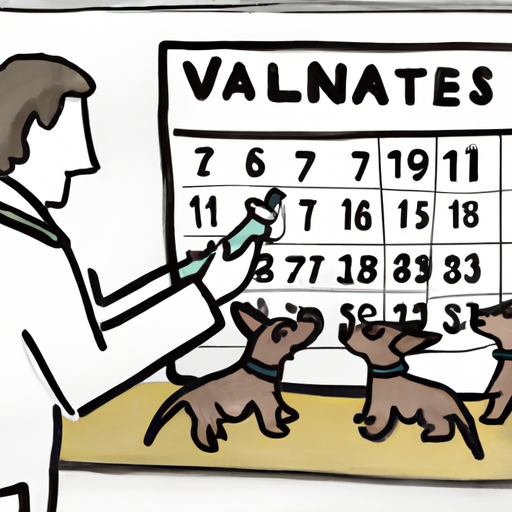Understanding Rabies and Vaccination
Rabies is a deadly disease that can affect any mammal, including your beloved canine friend. It’s a viral disease that affects the central nervous system, often leading to severe neurological issues. But don’t fret! As a responsible caregiver, you have the power to protect your furry companion through regular rabies vaccinations.
Schedule of Rabies Vaccination
Typically, here’s the recommended schedule of rabies shots for dogs:
- First vaccination: No earlier than three months of age
- Booster shots: One year after the first vaccination
- Regular boosters: Every one to three years, depending on your location’s laws and regulations
Remember, it’s crucial to stick to this schedule to ensure the utmost protection for your pet.
Factors Influencing Vaccination Frequency
The frequency of rabies shots can be influenced by several factors. These include:
- Age: Puppies are usually vaccinated at three months old and again at one year. Adult dogs might need shots every one to three years.
- Health condition: Dogs with chronic health issues may need specific vaccination schedules.
- Local laws and regulations: Different states or countries may have their own rules about pet vaccination.
- Lifestyle: Outdoor dogs or those who regularly interact with wildlife may need more frequent shots.
Risks and Side Effects
While rabies shots are generally safe and effective, they aren’t without risks. Some dogs may experience mild side effects such as:
- Temporary discomfort at the injection site
- Mild fever
- Reduced appetite and activity
Severe reactions are rare but can include vomiting, diarrhea, difficulty breathing, and seizures. Always consult with your vet if you notice anything unusual after your dog’s shot.
| Symptoms | Frequency |
|---|---|
| Mild Side Effects | Common |
| Severe Reactions | Rare |
FAQ
Q: Can my dog get rabies even after vaccination?
A: While rare, it’s technically possible. However, vaccinated dogs are at a significantly lower risk.
Q: What if I miss my dog’s booster shot?
A: It’s best to reschedule as soon as possible. Consistency is key to maintaining immunity.
Q: Can I vaccinate my dog at home?
A: No, rabies vaccines should only be administered by a licensed vet.
Q: How can I make shots less stressful for my dog?
A: Positive reinforcement (like treats or toys) can help. Also, staying calm yourself can also help your dog stay calm.
Remember, your vet is your best resource when it comes to your dog’s health. So, don’t hesitate to ask them any questions you might have about rabies shots. After all, it’s all about keeping our furry friends safe and healthy!



